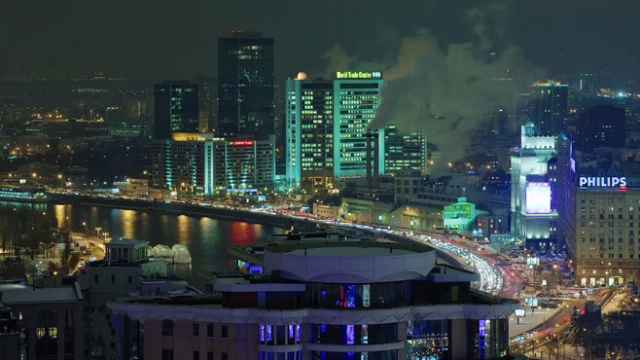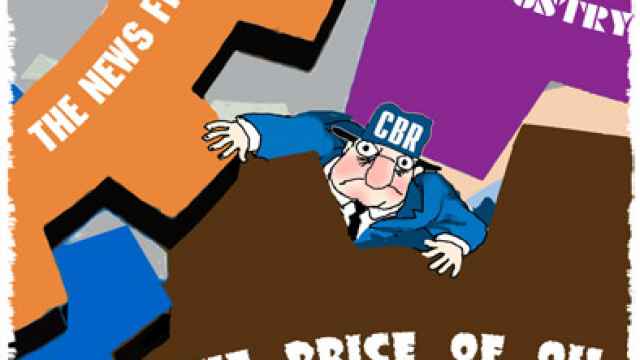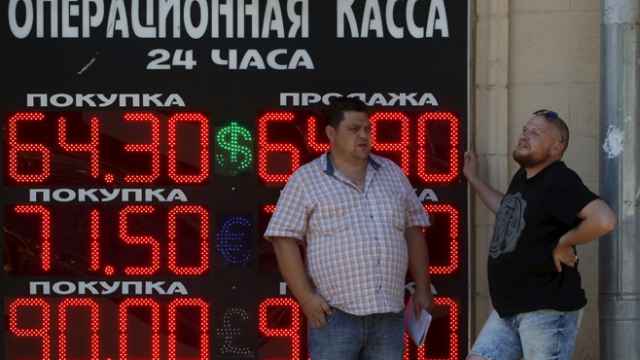For much of the past three years, ever since the macroeconomic indicators began to slip from the third quarter of 2012, it has generally been right for strategic and portfolio investors in Russia to consider the glass to be half empty. Pessimism is now so ingrained in the psyche of investors that any evidence of a turning point will likely be dismissed until established beyond question. We have seen that several times in Russia since 1998 and, no doubt, will again. But, don't worry, I have not taken leave of my senses and about to tell you all is well in the economy and it is safe to jump back into the stock market. By almost all measures, we are a long way from that. Almost all.
For the adventurous, it is worth pointing out the modest increase in optimism that some of the sanctions, or the terms of those sanctions, imposed against Russia in 2014 may start to ease in 2016 and that this may allow the economy to return to "acceptable" growth in the 2.5 to 3.0 percent range, in 2017.
The reason for the optimism is the continuing cease-fire in eastern Ukraine and the hope that the perception of progress in shifting the focus from a frozen conflict to a political solution may be validated. Clearly any confirmation that such a move in sanctions becoming more likely would have a significant impact on the value of Russian equities and debt and start to unlock some of the suspended investment projects.
Before considering how that might happen and what he impact might be, it is worth reminding ourselves of the facts about sanctions. There is a great deal of confusing noise on the subject which has added to the perception of investment risk and cut investment flows.
There are two categories of sanctions; the Crimea sanctions and those linked to events in eastern Ukraine. Nobody expects the Crimea sanctions to be eased or removed "indefinitely" as Crimea will remain part of the Russian Federation. But these sanctions have no material impact on the economy or the stock market valuation.
With regard to eastern Ukraine, there are three separate sub-categories; sanctions which are linked to the defense industries, including the ban on dual use technologies; those applied to certain projects in the oil sector and those which block state banks and some other state institutions and companies from accessing Western credits with a maturity beyond 30 days. It is not expected that the first two categories, i.e. affecting the defense and oil sectors, will be eased in the foreseeable future and are not part of optimistic scenario.
So, when it is stated that sanctions usually remain in place for many years, these are the categories where that is likely to be true for Russia. But increasingly these sanctions will become less relevant as Russian companies find work-arounds and source more equipment from Asia. Western sanctions applied to China after Tiananmen Square are, for example, still fully in place and are irrelevant. The only sanction category which really matters for the Russia story is the block on accessing Western debt and credits and this is the category where there is a flicker of optimism for improvement during 2016.
First let us also be clear on the oil versus sanctions debate as a cause of the current recession. It was the oil price slide, not sanctions, which almost entirely brought the economy to its current position. Specifically it was the ruble collapse and the contagion from that which derailed the economy. The ruble was almost unchanged from Crimea weekend (March 2, 2014) until mid-August that year even though sanctions tightened.
It was only when the oil price cracked in that the ruble started its precipitous decline. Both fell in tandem over the last four months of 2014. The sharp ruble decline resulted in the emergency interest rate hike and the spike in inflation to over 17 percent by end March this year. That combination, plus the big hit to consumer confidence, directly led to the near 10 percent drop in real wages, in retail sales and in such rate sensitive sectors as construction.
The financial sector sanctions were part of the negative backdrop for sure but less of a factor than the already weakening state of the economy coming out of 2013. In other words, the patient was already showing symptoms of a cold in 2013 and the oil price collapse turned that into a full blown flu.
A critical point at this stage, however, is that while the oil price collapse pulled the economy into a recession which would otherwise have been either very mild or avoided, a higher oil price would only help the economy pull out of recession but would not facilitate growth returning to the targeted 3 to 4 percent level. For that to happen the financial sector sanctions would need to come down and allow Russian banks, industrial companies and the state to again access Western debt markets and at reasonable interest rates.
The problem with the financial sector sanctions is not entirely because of the block on state banks and institutions accessing new debt but the fact that this sanction led to a total block on any Russian entity accessing any Western credits. Recently, as the news from eastern Ukraine has improved and at least raised hopes that sanctions will not get worse, some Russian companies have been able to get new debt denominated in euros. But the interest rate charged is well above that available to comparable Western companies and so the flow remains light.
It can be stated that if only the EU makes such a concession while the U.S. does not then the positive impact will be limited as no EU bank will go against U.S. sanctions. The first point to make is that, unlike the very long lived Jackson-Vanik restrictions again Russia, the U.S. sanctions are a) designed to be scalable both up and down and, b) are at the discretion of the White House and not Congress. Still, any move by the U.S. is not considered likely ahead of the inauguration of the next president in early 2017.
The hope, therefore, and the basis of the emerging optimism, is that if there is even some easing in that sanctions category by the EU countries, the voluntary restrictions adopted by EU institutions will be disproportionately eased and allow non-sanctioned Russian companies and entities to access a bigger volume of new debt and at reasonable rates.
One of the unintended consequences of the financial sector sanctions has been the cold-turkey deleveraging of external debt by the state and by corporations. At the start of 2014 the total volume of external Russian debt was $740 billion. By the end of this year it should be less than $500 billion. It means that when the opportunity to borrow re-opens, Russia will be in a good position to acquire new debt and to start investing in some of the recovery programs, such as localization and infrastructure improvement, now planned.
That's why the financial sector sanctions now matter more than an oil price rally. They did not inflict the damage but they hold the solution to long-term recovery. To that end, a continued shift away from a frozen conflict outcome to a political solution in eastern Ukraine is now the most important consideration for investors and (one hopes) for the Kremlin.
Chris Weafer is a senior partner with Macro Advisory, a consultancy advising international companies and investors working in Russia and across the Eurasia region.
A Message from The Moscow Times:
Dear readers,
We are facing unprecedented challenges. Russia's Prosecutor General's Office has designated The Moscow Times as an "undesirable" organization, criminalizing our work and putting our staff at risk of prosecution. This follows our earlier unjust labeling as a "foreign agent."
These actions are direct attempts to silence independent journalism in Russia. The authorities claim our work "discredits the decisions of the Russian leadership." We see things differently: we strive to provide accurate, unbiased reporting on Russia.
We, the journalists of The Moscow Times, refuse to be silenced. But to continue our work, we need your help.
Your support, no matter how small, makes a world of difference. If you can, please support us monthly starting from just $2. It's quick to set up, and every contribution makes a significant impact.
By supporting The Moscow Times, you're defending open, independent journalism in the face of repression. Thank you for standing with us.
Remind me later.








